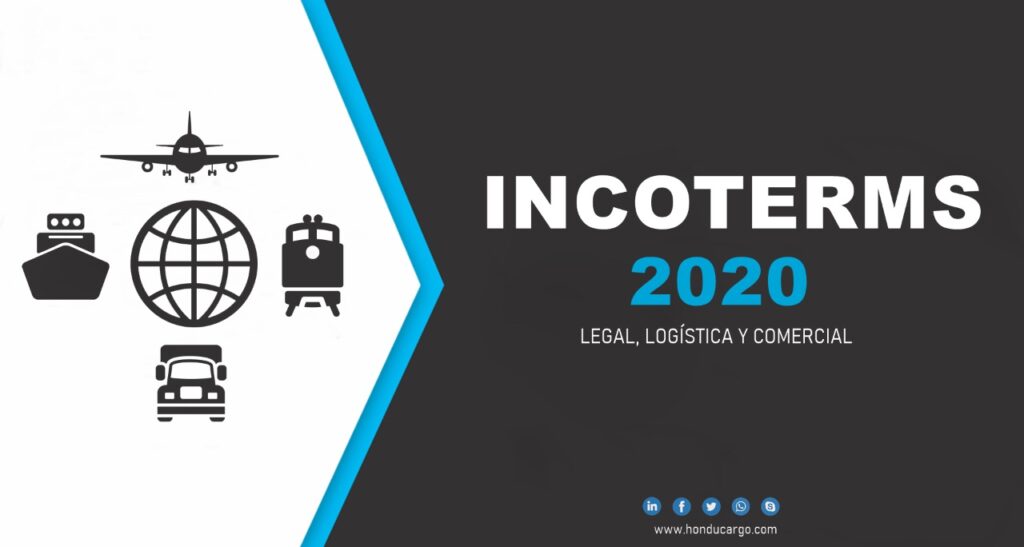Introduction:
The Incoterms rules are recognized worldwide as the commercial terms for the sale of goods, which offer security and clarity in trade and its users worldwide. They were created to establish commonly accepted rules in the sale of merchandise among merchants worldwide.
The 9th version of the Incoterms 2020 has been officially released on September 2019 and will come into effect from the 1st of January 2020.
The Incoterms(abbreviation of International Commercial Terms) rules developed by the International Chamber of Commerce was created as an industry standard to facilitate international trade and for the interpretation of the trade terms that the parties to a contract of sale could agree to apply.
What are the Incoterms?
they are international rules for the interpretation of commercial terms, such as the establishment of some rights and obligations of the parties in a purchase and sale contract and in relation to the delivery of the goods sold.
What is the main objective?
It is to facilitate the operation of international trade transactions, such as establishing a set of terms and rules that determine the rights and obligations of both the seller and the buyer. The renowned trade terms for the delivery of goods, providing certainty and clarity to business and traders everywhere.
What is the main purpose?
The main purpose of Incoterms is to provide a uniform constant and authentic interpretation of the commercial terms of delivery of goods, most frequently used in International transactions and by means of their application, removing any uncertainty due to divergent interpretations.
Operators from different countries, with different legislations, can at last rely an uniformed, unambiguous and authentic interpretive sources for properly and fairly sharing the costs and the risks arising from the delivery of the goods.
The use of such clauses is discretionary and for the sake of their validity, both parties of a salescontract have to agree upon in advance through a specific mention on such contract.
In addition, they precisely define the following aspects:
- Who pays for the main transport?
- Where does the delivery take place?
- Where and when the risk is transferred from the Seller to the Buyer?
- Who bears all the fees arising from transport and issue of documents, unloading of goods at destination, customs clearance when neccessary, insurance of goods etc.
Updated Incoterms for 2020:
- The DAT (Delivered at Terminal) is replaced by the new DPU (Delivered at Place Unloaded) incoterm in which it is allowed to continue agreeing door-to-door transportation. In addition, with the commitment that the seller does not take charge of the tax procedures at destination, but the recipient takes care of them.
- Regarding the CIP (Carrier and Insurance Paid To – Transport and Insurance paid), new maximum insurance conditions have been set, with greater risk coverage and higher compensation.
- In the case of the FCA (Free Carrier-Franco Carrier) the new rules include the possibility that the seller may have a copy of the transport document, which is considered essential to prove that the delivery has been made.
As it has been announced, the new Incoterms will continue to be 11 in total with their distribution between intermodal Incoterms and Maritime Incoterms. They will continue to be led by classics such as the EXW, the CIF or the FOB
Removal of Incoterms in 2020:
- FAS or Free Alongside Ship,it is rarely used, since it does not contribute great differences with the FCA. The FAS is used in a timely manner in the international trade of commodities (basic goods), but the ICC is already studying the possibility of creating a specific Incoterm for that type of merchandise.
- DDP o Delivered Duty Paid and EXW o Ex Works, it will disappear because within its characteristics there are contradictions with the current customs code.
Unfolded Incoterms in 2020:
- The DDP requires that the seller pay all customs duties at destination no matter where that destination is. The new changes will make the final destination clearer.
The DPP stands for Delivered at Place Paid. It means that the seller is responsible for the transportation cost as well as customs duties when the goods are delivered a final destination.
The DTP stands for Delivered at Terminal Paid. It means that the seller is responsible for transportation costs as well as customs duties when the goods are delivered to a final port.
- FCA it was unfolded to create a specific one for the maritime delivery merchandise and another for the terrestrial delivery.
Incoterms rules, are more accessible and easier to use, includes more detailed explanatory notes with enhanced graphics to illustrate the responsibilities of importers and exporters for each Incoterms rule. And it also includes a more detailed explanation on how to choose the most appropriate rule for a given transaction, or how a sales contract interacts with ancillary contracts.
by/Read more…

